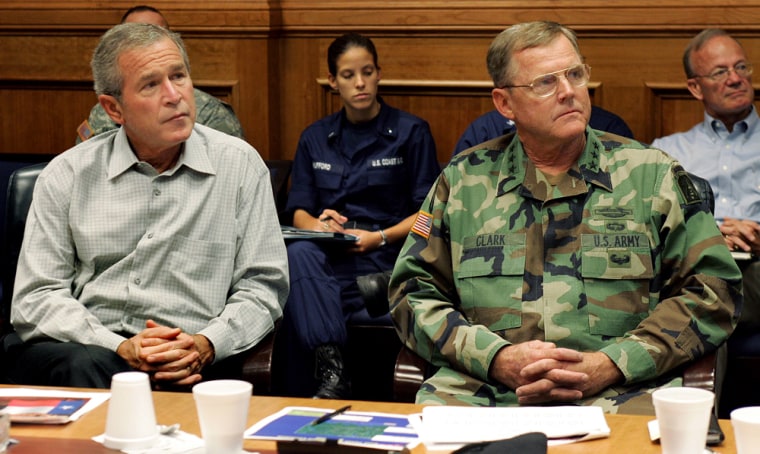President Bush on Sunday wrapped up a three-day trip designed to convey hands-on leadership during the Gulf Coast hurricanes, promising to act on military leaders’ request for a national search-and-rescue strategy.
“It’s precisely the kind of information that I’ll take back to Washington to help all of us understand how we can do a better job in coordinating federal, state and local response,” Bush told commanders.
Bush heard military leaders plead for a national plan to coordinate search-and-rescue efforts. Maj. Gen. John White, a member of the military’s joint task force on Rita, said that the current plans were so scattered that five helicopters might show up at once to rescue the same person.
“That was a train wreck that we saw in New Orleans,” he said.
‘We may not have that time’
Rita was different, he said. But White warned that a more sudden natural disasters or even a terrorist attack might leave much less time for planning. “We may not have that time in an earthquake scenario or similar incident,” White said.
Maj. Gen. M. Scott Mayes, speaking to Bush via videoconference from Tyndall Air Force Base in Florida, agreed. “With a national plan, we’ll have a quick jump-start and an opportunity to save more people.”
Bush indicated that he wants more authority for the armed forces in natural disasters, The military is barred by law now from performing any domestic law enforcement functions
Bush first broached that idea in a speech to the nation from New Orleans last week.
The president said he wants to examine whether the Defense Department should be the lead in a natural disaster “of a certain size” as they would after any terrorist attack. “That’s going to be a very important consideration for Congress to think about,” he said.
Between his departure from the White House on Friday and his return Sunday afternoon, the president attended more than seven hours of briefings in four cities about Hurricane Rita. But the president avoid direct contact areas affected by the storm, making sure not to get in the way of rescue efforts.
The best chance for a look came during his Air Force One flight from San Antonio to Baton Rouge. The plane went over Port Arthur, Texas, and Lake Charles, La., but flew most of the time above significant cloud cover.
Making the rounds
Over the weekend, the president spent almost a day at the headquarters of the U.S. Northern Command in Colorado Springs, Colo. The command, set up after the attacks of Sept. 11, 2001, is in charge of homeland security for the military.
Bush spent Saturday night and early Sunday in San Antonio, never leaving Randolph Air Force Base. Upon his arrival, he thanked the mayor for San Antonio’s generosity in taking in hundreds of thousands of Katrina evacuees. On Sunday, Bush went to church on the base.
He skipped a visit to nearby Fort Sam Houston, a main federal staging area for supplies and personnel used in Rita.
He stopped in the capitals of the two states most affected by Rita. Bush spent a little over an hour at an emergency operations center in Austin, Texas, on Saturday. He took about the same amount of time at a FEMA joint field office in Baton Rouge on Sunday afternoon.
‘We ask for God’s blessings’
“I know the people of this state have been through a lot. We ask for God’s blessings on them and their families,” Bush said at an abandoned department store that FEMA has turned into its hub of operations in twice-struck Louisiana.
Bush urged people who left homes and businesses because of the storm to be careful about returning. He also he wanted to see federal-state coordination up close.
He got a boost from Louisiana Gov. Kathleen Blanco, who was critical of Katrina response efforts. She told Bush things went more smoothly with Rita, which slammed ashore early Saturday with top winds of 120 mph.
“I do want to tell you how much we appreciated watching all of the integrated forces at work as one,” Blanco told Bush.
